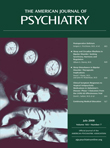Sleep and Circadian Rhythms in Bipolar Disorder: Seeking Synchrony, Harmony, and Regulation
Abstract
Despite advances in the treatment of bipolar disorder, a significant proportion of patients experience disabling symptoms between episodes, and relapse rates are high. These circumstances suggest that there is a critical need to achieve a mechanistic understanding of triggers of relapse and to target them with specific, empirically derived treatments. Sleep disturbances are among the most prominent correlates of mood episodes and inadequate recovery, yet sleep has been minimally studied in ways that integrate mechanistic understanding and treatment. In this article, the author seeks to define the limits of current knowledge and to specify preliminary clinical implications. Sleep disturbance is important because it impairs quality of life, contributes to relapse, and has adverse consequences for affective functioning. While sleep disturbance and circadian dysregulation are critical pathophysiological elements in bipolar disorder, many questions about the mechanisms that underpin the association remain. The author presents a model that recognizes a role for genetic vulnerability and suggests that there is a bidirectional relationship between daytime affect regulation and nighttime sleep such that an escalating vicious circle of disturbance in affect regulation during the day interferes with nighttime sleep/circadian functioning, and the effects of sleep deprivation contribute to difficulty in affect regulation the following day.



